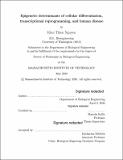Epigenetic determinants of cellular differentiation, transcriptional reprogramming, and human disease
Author(s)
Nguyen, Khoi Thien.
Download1241089013-MIT.pdf (7.683Mb)
Other Contributors
Massachusetts Institute of Technology. Department of Biological Engineering.
Advisor
Manolis Kellis.
Terms of use
Metadata
Show full item recordAbstract
Much of the diversity we observe in cellular and organismal phenotypes can be attributed to epigenetic and genetic variation. DNA provides the instructions for life, while epigenetic modifications regulate which parts of the genetic information contained in DNA can be read out in a given cell and how this information is interpreted. In recent years, epigenetic and genetic variation has been profiled on a large scale with sequencing-based assays, generating many datasets to be explored. In this thesis, I present three projects which apply computational techniques to identify and characterize epigenetic mechanisms that may contribute to the regulation of phenotypic variance. First, we mine a dataset charactering the epigenomes of diverse cell types in order to discover signatures of adult stem cell differentiation. We identify a novel marker of the multipotent state, a chromatin state characterized by the histone marks H3K36me3 and H3K9me3, and describe biological processes that may be linked to the loss of this chromatin state in fully differentiated cell types. Next, I present what we learned from profiling the epigenetic state of cells before and after transplantation into Xenopus oocytes, a process that transcriptionally reprograms the cells. This analysis elucidates how the initial epigenetic state of a cell influences the success of cellular reprogramming and identifies transcription factors that help regulate this process. Finally, we integrate studies measuring the effects of genetic variants on disease with studies measuring the effects of genetic variants on transcriptional and epigenetic activity. This identifies specific mechanisms underlying disease processes, and demonstrates that transcriptional and epigenetic mechanisms may independently contribute to disease pathogenesis. Together, these projects demonstrate the biological insights that can be gained from epigenetic profiling, and expand our understanding of the potential effects of epigenetic modifications.
Description
Thesis: Ph. D., Massachusetts Institute of Technology, Department of Biological Engineering, May, 2020 Cataloged from student-submitted PDF version of thesis. Includes bibliographical references (pages 111-130).
Date issued
2020Department
Massachusetts Institute of Technology. Department of Biological EngineeringPublisher
Massachusetts Institute of Technology
Keywords
Biological Engineering.